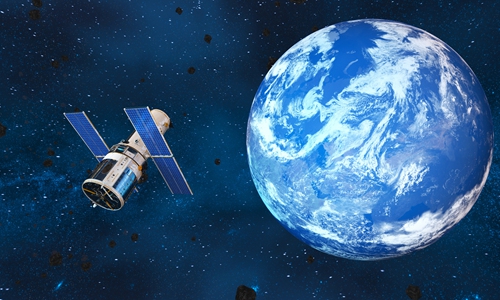Space Operations Squadron embodies Japan’s military ambitions
Source:Global Times Published: 2020/5/21 22:09:20

Photo: IC
The Japanese Defense Ministry on Monday established the Space Operations Squadron. This is Japan's Self-Defense Forces' first unit dedicated to outer space, and it will monitor space debris and suspicious satellites with the stated aim of aiding Japanese satellites to avoid collisions, according to the Japan Times.
The so-called monitoring of space debris and suspicious satellites, however, is not believed by all. Japan, which surrendered at the end of World War II (WWII), has been forbidden from maintaining an army, navy or air force, according to Article 9 of Japan's pacifist Constitution.
Against this backdrop, establishing the Space Operation Squadron seems to go against Article 9. Out of the need to defend itself, Japan portrays an image that it is making a contribution to all humanity in outer space.
The US Space Force, established in December 2019, has a more clearly defined and straightforward intention - to block Russia and China. In a report released in January, US Defense Intelligence Agency warned that Russia and China were capable of spying on the US from space, International Business Times reported on Monday.
Judging by previous moves of the US-Japan alliance, the US is clearly taking the lead and Japan is offering assistance to its ally in their cooperation in outer space. By establishing space force, Japan will help the US to achieve what the latter intends, including dealing with perceived threats from Russia and China.
The Space Operations Squadron will coordinate closely with the US in the domain of space. It will cooperate with the US Space Command which President Donald Trump established in 2019, the New York Times reported. Squadron chief Ajiki said he hoped to discuss how to share information with counterparts in the US as the US operates a global space-surveillance network, according to Japanese broadcaster NHK.
Since the end of WWII, the US-Japan alliance has been expanding its agendas, from conventional military fields to others. The two countries extending their cooperation in space is another example of this. They have raised their crisis awareness, worrying that certain countries' development in space will threaten their interests.
Both Washington and Tokyo want to benefit from expanding control of space. The US is seen by some as hoping to augment its hegemony. Not satisfied with limiting its hegemony to a certain region or area on Earth, space is an ideal domain where it can boldly expand.
In terms of Japan, building the Space Operations Squadron reveals its ambition of becoming a military power again. Japanese Prime Minister Shinzo Abe has repeatedly proposed amending Japan's Constitution by adding an explicit reference to the Self-Defense Forces. Coordinating with the US in the realm of space will help Japan ramp up its military capability as well.
In recent years, Japan has been pursuing the loosening of restrictions of its pacifist Constitution, and its military cooperation with the US is expected to continue to expand. Their deepening coordination in space adds uncertainties to international security.
In space, the two countries can collect information on any other country with fewer barriers and share such information with each other. This coordination could be perceived as a threat to the national security of other countries across the world.
The article was compiled by Global Times reporter Lu Yuanzhi based on an interview with Lü Yaodong, director of the Institute of Japanese Studies at the Chinese Academy of Social Sciences. opinion@globaltimes.com.cn
Posted in: VIEWPOINT